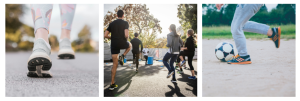Physical Activity
What is Physical Activity?
Physical activity refers to any activity that gets your body moving and releases energy.1 According to Teychenne et al., these activities can include “recreational or leisure-time physical activity, transportation (e.g. walking or cycling), occupational (i.e. work), household chores, play, games, sports or planned exercise”.2

Why is Physical Activity Important?
Physical activity is important because it can have major positive impacts on your physical and mental health. In fact, research suggests physical activity may help:
- Prevent and manage depression, anxiety, and post-traumatic stress disorder1
- Prevent chronic medical conditions including cardiovascular disease, hypertension, stroke, colon and breast cancer, diabetes, and osteoporosis.2
As many of these physical and mental health conditions affect survivors of domestic violence, you can see how influential physical activity can be for your body.
Physical Activity Recommendations
When it comes to physical activity recommendations the most important thing to remember is that some exercise is better than no exercise. Click on the chart below to learn more about current recommendations.1-3
It can be overwhelming to consider how you might incorporate exercise into your day. One of the best ways to build this habit into your daily lifestyle is to create a plan. Click here for templates to create a daily schedule. As you plan to incorporate exercise into your day consider what time a day you typically feel the best (e.g. morning, afternoon or evening), how much time you have to do an activity, and what activity you would like to complete.
Key Takeaways
- Physical activity has the opportunity to prevent and manage many different physical and mental health outcomes for survivors of domestic violence.
- It is recommended to complete 150 minutes of moderate exercise or 75 minutes of vigorous exercise per week.
- Examples of physical activity include walking, biking, completing household chores, running, dancing, playing a sport and so much more.
